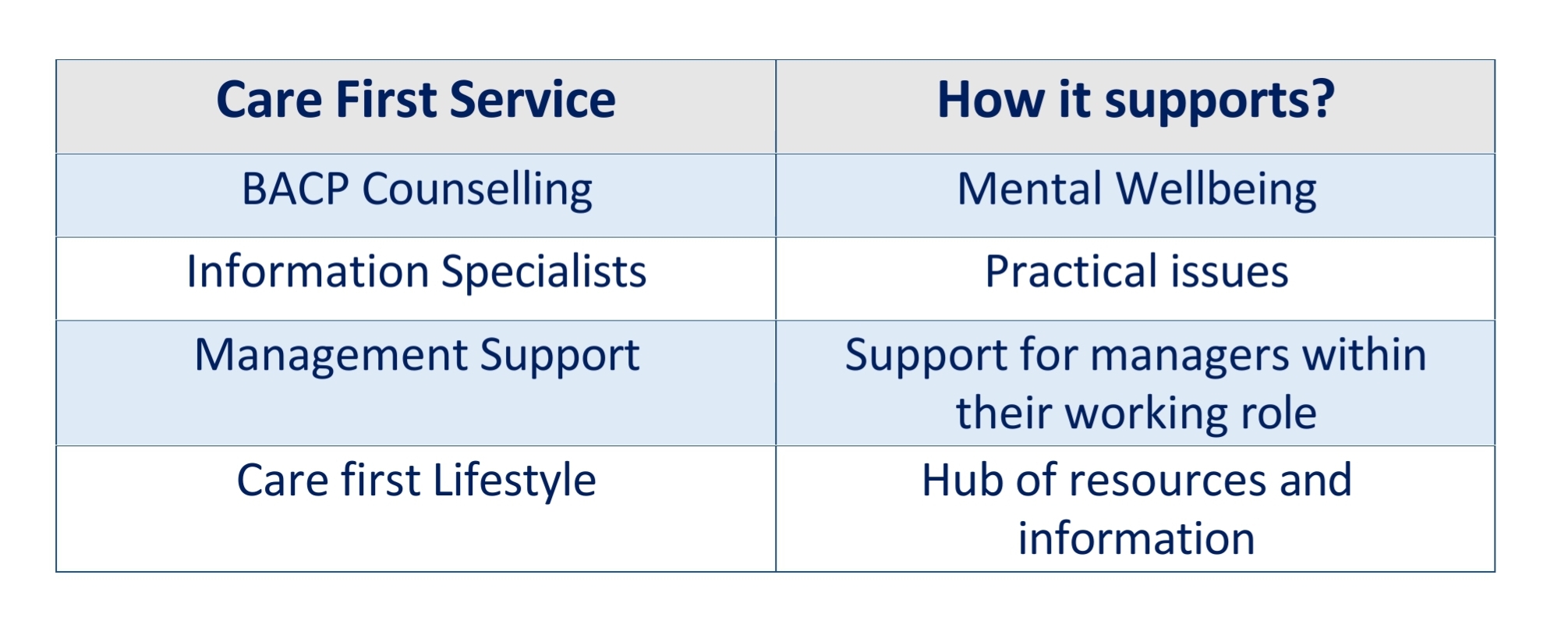Counselling support
Our team of professionally trained, qualified and BACP Accredited Counsellors are available 24/7 to offer support for personal or workplace related issues. As well as the headline issues surrounding mental health, our Care first counsellors are also trained in dealing with both work and home grievances, bullying & harassment issues, domestic violence, relationships at both home and at work and much more. No matter how big or small the problem may be, our counsellors are here for you to provide you with unbiased support away from the situation. Everyone has very individual needs for support, Care first provides short term focussed counselling, so the Care first Counsellor will assess your circumstances when you call to establish what the most appropriate form of support will be for you. It might be that you just need a brief conversation with the Counsellor that day, or you may benefit from a few more sessions.
Information Specialists
As control, or the lack of it, can be an influencing factor on the impact of stress. Many individuals identify stress as emotional, however, a lack of control around practical issues can be just as impactful. We have expert advisors that have been trained by Citizens Advice who can provide you with comprehensive answers and assistance on a wide range of practical issues which can affect our daily life, these include but are not limited to; redundancy, advice on funerals and probate, legal information, housing and tenancy issues, childcare, eldercare, health, consumer issues, employment, travel and education. Our Information Specialists are also money trained experts and can provide support with a variety of financial queries such as help with budgeting finances and advice with benefits. You can speak with one of our Information Specialists confidentially Monday-Friday between 8am-8pm.
Management Support
If you are a manager, have leadership responsibilities, or look after a team within your organisation, it is as important as ever that your colleagues are made aware of the range of support available from Care first. As well as supporting you to signpost your colleagues to the Care first service effectively to maintain your managerial boundaries, Care first can also provide you with support within your role as a manager. Care first Counsellors are all management trained and can provide support with issues such as if the organisation is going through a period of redundancy, managing change and difficult conversations, workplace performance, remote working, absence management and disciplinary.
Care first Lifestyle
Through the Care first lifestyle site you can access a wide range of supportive information, read helpful articles published by our team, view Webinars covering a variety of well-being topics and even speak with a Care first Counsellor in real-time via our online counselling facility.
You can log into your account by visiting www.carefirst-lifestyle.co.uk and logging in using your organisation’s unique log in details. If you are unsure what these details are then please contact your line manager or HR department. The Care first Lifestyle website is great place to go to learn more about Care first and the different areas that we can support in.
How all of these above services link together
As you can see from the above table, all the services that we offer complement each other to ultimately encompass an individual’s overall mental and physical wellbeing, which enables individuals to access professional and clinically proven support.
Our counselling support is available 24/7 to help individuals with any emotional issues that they may have. Our Information Specialists can help individuals with practical information and advice. This practical support is so important because if an individual is concerned about a practical issue, then this can cause detrimental effects to their emotional wellbeing. By getting some support from an Information Specialist this will provide the individual with some clarity on that particular issue, which may help them to feel more in control of a situation and relieve some anxiety.
The Care first Lifestyle site can help individuals who are concerned about an issue. The individual may not know where to start and they can have a look at the resources on our Lifestyle website which may be enough to help them. The Lifestyle website is a great starting place to learn about the types of issues that Care first can support with. The individual can also access our online counselling tool through the Lifestyle website which is an alternative way to access support from a counsellor. By an individual looking through all the resources on our Lifestyle website this can help them to get answers about an issue they may be having. Again by getting some clarity on their issue this may have a positive effect on their mental wellbeing.
If you would like to learn more about ‘How Care first can support you’ then please join our webinar on Wednesday 1st February at 12pm using the details below –
https://attendee.gotowebinar.com/register/7670559681117957466
If you are unable to join the webinar live, a recording of the session can be accessed using the same link above after the webinar has taken place.
If you wish to contact the Care first telephone counselling and information line then please don’t hesitate to call the Freephone number provided by your organisation and you can speak to a professional in confidence.


